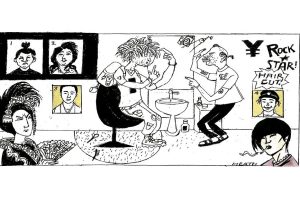One victim of police brutality is police decency. Our son has a tutor, J., who works with autistic kids in our corner of West Cork. After lockdown began, she was no longer able to work with her students, one of whom had a birthday coming up in March. The boy lives in Bandon, 15 miles away, so J. phoned our local garda station to ask for permission to drive beyond the lockdown radius to deliver a small gift and card. The garda on duty gave her a polite no, as birthdays weren’t on the list of exemptions. Fair enough. Twenty minutes later, the sergeant called J. back. He had to visit the Bandon garda station that afternoon, so if she could bring him the gift, he would hand it on to a colleague in Bandon, who would deliver it at the boy’s house on his way home that evening. Mission accomplished. All this may sound like the plot to a kid’s TV show, but for a non-verbal autistic kid whose routines and connections are a reality-map, that garda’s act of kindness was a big deal. It wasn’t done for press coverage or approving tweets, but because the gardi who made it happen are decent human beings. Cut to: a video of a white supremacist cop in Minneapolis killing an unarmed African American by crushing his windpipe for nine minutes. Policing rural Ireland is easier, no doubt, than policing urban America, but whatever the context, let’s not let the worst besmirch the best.
I’m always a bit ‘Oh aye?’ about diarists who use their 850 words to plug a new novel: but honest, dear reader, the biggest splash in my locked-down world this week was an online conversation for the Hay Digital Festival with publisher, pig-farmer and Renaissance Man John Mitchinson. We spoke about writing, music and my, um, new novel, Utopia Avenue. This being my first ever online event, I wasn’t sure how it would compare to an onstage version. I loved it. Our allotted time rattled by hitchlessly. A moderator sifted a shortlist of offbeat questions which John cherry-picked for the Q&A, and then it was over and I went downstairs for my noodles and kimchi. I could have happily gone on for another hour. I like the Hay Festival a lot, and I hope the physical festival is back in 2021. And — not but — the virtual audience I reached from my back bedroom was greater, by far, than any I’ve addressed in a marquee in the Welsh borders, or elsewhere. Thinking of all the air-miles not taken, of all the readers who can’t get to festivals, I suspect that one long-term legacy of 2020 will be a reinvention of what a festival is.
As for festivals, so for book tours. My 2020 calendar is a palimpsest of white stickers, covering my commitments for publication agreed pre-pandemic. Over the stickers are written the details of Zoom interviews, with more digital events pencilled in. The virtual book tour — until 12 weeks ago, a fanciful oxymoron — is being invented, in earnest, on the hoof. Marketing norms are in the wheelie bin, new ideas are on the table, unknowns are everywhere. Will readers pay to watch an author interview, or a reading? Could the price of an e-ticket be knocked off the price of a book? How can we avoid a digital event for, say, a Boston bookstore being a rerun/rehash of my earlier event for the Hay Festival? Could a virtual signing queue be a goer? How? What if publishers offer ‘extra content’ for pre-orders, the way record labels do? What is ‘extra content’ for a novel? The only way to find out is to try things out. Some ideas will fail. Some ideas will half-work. Some will lead to new ways for writers to engage with a readership. I do hereby declare myself a curious and willing guinea pig.
A final result of lockdown has been a love affair with kimchi which, as Spectator readers will know, is a staple Korean side-dish of salted, fermented vegetables. Making it is sticky, tactile fun. Strip the leaves off a cabbage (officially a Napa, but rubbery ones work too); wash, rub with salt, and dunk in a bowl. Chop a giant white radish and/or a carrot into little sticks. Zap ginger, garlic, chilli powder, red pepper gochugaru (if you can get it) into a runny paste. Bung in whatever’s in your veggie tray: cauliflower florets, spring onions, chunks of cucumber, you can’t go wrong. Mulch together and ladle into a Kilner jar, pressing down each time. After two or three days your jar of spicy, mouth-zapping, effervescent joy is ready. Sure, kimchi is an acquired taste, but isn’t that true of many of life’s enduring pleasures?


















